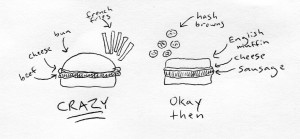I would really enjoy hearing someone say “He’s not a very good housekeeper” or “She doesn’t help out much around the house,” instead of ALWAYS WITH THE PRONOUNS THE OPPOSITE WAY. We’ve mastered the “men don’t ‘babysit’ their children” concept; I vote for housework to be next. Paul rolls his eyes at my household-cleanliness fretting/self-consciousness, but I think that eye-rolling comes from being 100% secure in the knowledge that NO ONE IN THE WORLD will come in and say, “Whoa. Paul’s not much of a housekeeper, is he?” NOT EVEN WHEN I WAS WORKING FULL-TIME AND PAUL WAS THE AT-HOME PARENT.
Speaking of which, we are playing Chore Wars at our house. I read about it in a book called Reality is Broken, which says, basically, “Instead of complaining about how people play computer games when they could be engaging with reality, why don’t we see if we can use what we’ve learned from computer game concepts to improve engagement with reality?”
Farming is not a whole lot of fun, I’m guessing. But make it into a Facebook game and people will do it for HOURS, UNPAID, for FUN. I remember when I was playing Sims, and I’d suddenly realize that I was spending an hour cleaning my Sims house and interacting with my Sims children while my actual house/children went unattended. We will willingly do things in a game that we don’t want to do in real life.
Part of is the whole “getting credit” concept, which is why I like my FitBit, and why I want something that tracks Good Citizen Points. Part of it is that it really is more fun to play a farming/cleaning GAME than to do actual farming/cleaning. But that doesn’t mean we can’t take some of the fun parts of the game and apply it to the actual chores.
This is what my brother and I used to do with chores when we were younger. Our least-favorite chore was filling the giant woodbin with a week’s worth of wood from the piles outside. It was tedious and uncomfortable and time-consuming and not particularly satisfying. Until we started pretending that there was a blizzard coming and that the number of days our family could survive was dependent on how much wood we could get into the house before the storm hit. Or we’d make a challenge to see if we could fit the logs together as snugly as possible to get the maximum amount of wood into the bin, with the challenge being to see if there’d still be wood in the bin the NEXT week when we had to do the chore. I mean, we still had to do the chore. It was still uncomfortable and it still took awhile. But it was a LOT more fun that way.
Chore Wars is similar: you still have to do the chores, and you still don’t enjoy them per se, but they’re MORE fun than before, and also you get CREDIT. I recommend it, if you think your family might enjoy it. I’ll say this for it: the children are coming home from school and racing each other to do housework. Someone OTHER THAN ME cleaned a toilet this week.
Paul and the kids are a lot more into the storyline than I am; I find the whole “battling monsters and collecting treasure” part uninteresting and unmotivating. (What I like best is GETTING CREDIT and having everyone see how many more points I have than they do.) I’ll add a new adventure such as “cleaning the toilet,” and Paul will change it to “polishing the throne in the hall of fountains” or whatever. I find this irritating when I’m looking for the chore in the list—but Paul pointed out that it’s the children’s favorite part so…it stays. Our arrangement now is that I add the chores with boring titles and no monsters/treasures, and Paul goes in later and spices them up, so that now there’s a 25% chance of encountering Jabba the Butt (sigh).
You set your own points system for each chore, and you can change it whenever you want. I like this because it might only take 5 minutes to clean a toilet, and points are supposed to be approximately 1/minute—but I want 20 points if I do it, and I’m happy to give 20 points to someone else for doing it. Hazard pay. Or, like, we’ll realize the children are doing a chore so often that now it doesn’t take as long: it takes a long time to clean the floor and wall around the cat dishes if it hasn’t been done for weeks, but it’s the work of a moment if it was done the day before.
You can also add “quests,” which are chores that disappear from the list when someone claims them. So for example, I’ve lost my wedding ring (woe), and so I put it on the list as a quest: 100 points to whoever finds it. Or if I want Paul to fix something, I can put it as a quest and it works a lot better than nagging.
